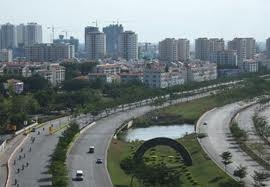Axe falls on southern hub property
 |
| illustration photo |
With $3.5 billion total registered capital, the Vietnam International University Township (VIUT) project developed by Berjaya Land Berhad under Malaysia-based Berjaya Corporation Berhad in Ho Chi Minh City’s Hoc Mon district is Vietnam’s first international-scale university-eco housing complex model.
As part of Ho Chi Minh City northwest urban area the project was licenced four years ago in July 2008 and slated to kick-off construction in early 2009. However, according to a developer representative just more than VND93 billion ($4.4 million) investment had been disbursed.
The project’s delay reportedly came from property market doldrums and investor’s limited financial capacity.
In this context the Northwest Urban Area Management Unit and relevant state agencies have many times claimed Ho Chi Minh City People’s Committee to take back the project’s investment certificate. However, the proposal has yet to get feedback from the city’s management.
Berjaya Vietnam Phuong Anh Phat director said the firm had made great strides to shortly complete site clearance phase to lure other investors.
Deputy director Nguyen Khac Phong at Saigon Real Estate Corporation, which established Ho Chi Minh City’s northwest urban area, said expediting projects under Ho Chi Minh City northwest urban area would help accelerate Hoc Mon and Cu Chi’s economic development.
The economic slump has also ignited conflicts between relevant parties, hurting projects.
This was the case with Eta Star project of Eta Star Company - a joint venture between Phuc Luu Quang Company Limited and Eta Star International based in the United Arab Emirates - licenced in 2008 with $112 million investment.
The project, positioned in District 2, sought to build a trading and housing complex for sale and for lease parallel to providing associated services.
Eta Star was also recommended for a licence withdrawal due to long delays derived from financial woes and conflicts among related parties. The foreign partner is seeking new partner, probably Prudential Investment Fund, for stake transfer.
The $130 million Saigon Sport City project is in a similar position as relevant parties fail to reach a common voice.
Keppel Land International director Linson Lim said the developer had undertaken to inject $2 billion into Vietnam projects, including three new urban area projects in Dong Nai and Ho Chi Minh City. However, only the Saigon Sport City project was given an investment certificate in 2009.
Under the project, a sports physical training and entertainment centre and a supporting services centre for Rach Chiec sports complex will be built on 79.7ha land plot in District 2.
The project faces having its investment certificate withdrawn due to divergence associated with compensation costs between investor and local government.
The investor offers a compensation rate VND500,000 ($24) per square metres against VND1 million ($48) per square metre compensation rate seen at land plots in surrounding area. District 2 People’s Committee asked the investor to hike the compensation rate but its proposal had yet to be accepted.
What the stars mean:
★ Poor ★ ★ Promising ★★★ Good ★★★★ Very good ★★★★★ Exceptional
Related Contents
Latest News
More News
- An Phat 5 Industrial Park targets ESG-driven investors in Hai Phong (January 26, 2026 | 08:30)
- Decree opens incentives for green urban development (January 24, 2026 | 11:18)
- Public investment is reshaping real estate’s role in Vietnam (January 21, 2026 | 10:04)
- Ho Chi Minh City seeks investor to revive Binh Quoi–Thanh Da project (January 19, 2026 | 11:58)
- Sun Group launches construction of Rach Chiec sports complex (January 16, 2026 | 16:17)
- CEO Group breaks ground on first industrial park in Haiphong Free Trade Zone (January 15, 2026 | 15:47)
- BRIGHTPARK Entertainment Complex opens in Ninh Binh (January 12, 2026 | 14:27)
- Ho Chi Minh City's industrial parks top $5.3 billion investment in 2025 (January 06, 2026 | 08:38)
- Why Vietnam must build a global strategy for its construction industry (December 31, 2025 | 18:57)
- Housing operations must be effective (December 29, 2025 | 10:00)

 Tag:
Tag:




















 Mobile Version
Mobile Version